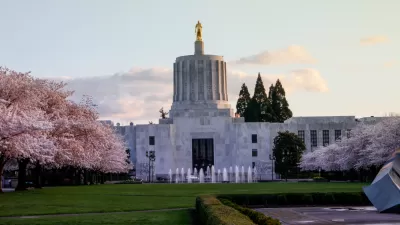With the re-election of Gov. Kate Brown and Democrats increasing their majorities in both legislative chambers, Oregon appears poised next year to pass the Clean Energy Jobs bill which caps carbon emissions, but opponents could put it on the ballot.

"The odds are good that proponents of the Clean Energy Jobs bill have the political will and muscle to get a bill through the Senate and House and likely gain Gov. Brown’s signature," reports Gary Warner for the Bend, Ore.-based Bulletin.
Gov. Kate Brown, who won re-election on Nov. 6 after replacing Gov. John Kitzhaber in February 2015, lists, "Implement a Market-Based Program to Reduce Emissions" in her "Action Plan for Oregon."
According to the Northwest-based clean energy economy nonprofit, Climate Solutions, the Clean Energy Jobs bill would do three things:
- Create a limit, or cap, on Oregon’s climate pollution that lowers each year;
- Set a price on each ton of climate pollution emitted by large utilities, fossil fuel companies, and the other biggest sources of pollution...
- Reinvest the proceeds in clean energy solutions – like solar and wind power, energy efficient homes and businesses, public transit, electric vehicles, and healthier communities. The bill prioritizes investment in communities hit first and worst by climate change.
Renew Oregon, a coalition of businesses and organizations for clean energy jobs, chronicles over two decades of legislative and gubernatorial attempts toward pricing carbon in the Beaver State, ending in:
2018: The Clean Energy Jobs bill is re-introduced (SB 1507 and HB 4001) as the most detailed, refined bill most carbon pricing experts have seen. Several hearings are held on the bill. It passes out of the Senate Energy and Natural Resources Committee and House Energy & Environment Committee. It doesn’t receive a floor vote.
Funding for a Carbon Policy Office and climate pollution monitoring is secured to lay the foundation for launching the cap and invest program on time. House Speaker Tina Kotek and Senate President Peter Courtney form, and co-chair, the nation’s first legislative Joint Committee on Carbon Reduction
However, carbon pricing advocates are proceeding cautiously due to what happened on Election Day on the opposite shore of the Columbia River – voter rejection of the second carbon pricing initiative since 2016.
"Could the same thing happen in Oregon?" asks Warner. "Like most things in politics, the answer is maybe."
[T]he state constitution allows opponents of a law to gather signatures to require voter approval of the law, called a referendum. If enough signatures are collected, the law would not go into effect until the vote.
Barry Rabe, director of the Center for Local, State, and Urban Policy at the Gerald Ford School of Public Policy at the University of Michigan, said the Washington vote shows the political difficulty of carbon cap policies at the ballot box.
Gas tax example
Gov. Brown points to the state's landmark transportation funding package last year, Keep Oregon Moving (HB 2017), that passed with bipartisan support in July 2017. It raised the gas tax by 10-cents per gallon over six years, added a new $15 bicycle excise tax, authorized value-pricing on two Portland area interstates, and added a half-cent motor vehicle sales tax to fund new rebate programs for zero and near zero-emissions vehicles.
“We’ll have a consensus approach,” Brown said last week. “More in line with the transportation package. We have to have stakeholder buy-in.”
Rabe, the University of Michigan professor, said how things play out is of great interest around the country and the world. “People are asking, “what about Oregon — what’s going on there?” Rabe said. “They’re watching.”
The stakes are high. If any state is going to join California in enacting a state-run carbon pricing program, it would appear to be Oregon, but a rejection by voters, should the Clean Energy Jobs bill become law and be subjected to a referendum, would prove a major setback for carbon pricing in the U.S.
-
No West Coast Climate Bloc, Nov. 7: Had election results proved favorable in Oregon and Washington, UC Berkeley Law Climate Program Director Ethan Elkind suggested that the two states could join California to form a West Coast Climate Bloc. Oregon came through, but not Washington.
FULL STORY: Carbon cap could face ballot challenge

Trump Administration Could Effectively End Housing Voucher Program
Federal officials are eyeing major cuts to the Section 8 program that helps millions of low-income households pay rent.

Planetizen Federal Action Tracker
A weekly monitor of how Trump’s orders and actions are impacting planners and planning in America.

The 120 Year Old Tiny Home Villages That Sheltered San Francisco’s Earthquake Refugees
More than a century ago, San Francisco mobilized to house thousands of residents displaced by the 1906 earthquake. Could their strategy offer a model for the present?

HSR Reaches Key Settlement in Northern California City
The state’s high-speed rail authority reached an agreement with Millbrae, a key city on the train’s proposed route to San Francisco.

Washington State Legislature Passes Parking Reform Bill
A bill that would limit parking requirements for new developments is headed to the governor’s desk.

Missouri Law Would Ban Protections for Housing Voucher Users
A state law seeks to overturn source-of-income discrimination bans passed by several Missouri cities.
Urban Design for Planners 1: Software Tools
This six-course series explores essential urban design concepts using open source software and equips planners with the tools they need to participate fully in the urban design process.
Planning for Universal Design
Learn the tools for implementing Universal Design in planning regulations.
Ada County Highway District
Clanton & Associates, Inc.
Jessamine County Fiscal Court
Institute for Housing and Urban Development Studies (IHS)
City of Grandview
Harvard GSD Executive Education
Toledo-Lucas County Plan Commissions
Salt Lake City
NYU Wagner Graduate School of Public Service





























